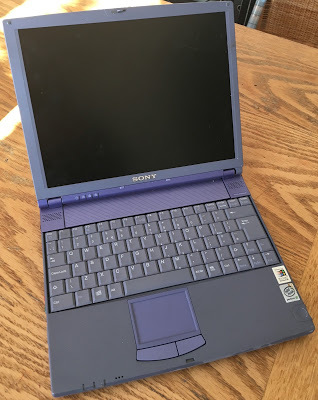
My defunct Sony laptop, designed, as the label says,
for Windows 98There has been an interesting evolution in the world of laptops - one that you might not even have noticed. It's a kind of mass extinction.
Back in the old days, when luggable PCs and laptops first entered the market (yes, I can remember than far back), there were two distinct types of manufacturer involved in electronics. Computer makers, mostly American - whether traditional (IBM, say) or newly minted (Compaq, Dell etc.) made computers - while consumer manufacturers, mostly from the far east, made things like TV sets and stereos.
It was a mystery why those consumer electronics giants never got into computing in a big way, but for some reason they only seriously took on one segment of the market - laptops. And they were very good at it. The first (actually, the only) laptop I ever bought was a top of the range Sony. It lasted me 10 years and was brilliant. It was also the consumer manufacturers (as opposed to the business-dominated computer firms) who realised it might be a good idea to bring out low cost netbooks and who, apart from Apple, dominated the stylish end of the market.
The big three were Sony (always the top end option), Samsung and Toshiba. But Sony pulled out of the market a few years ago, then Samsung followed suit. And now Toshiba is ceasing to make consumer laptops (they say they intend to stay in the business market - but it would seem an odd long-term decision). All three are now gone.
What has happened? It's certainly true that desktop computer sales have plummeted, while Apple and Microsoft's high end tablets have nibbled away at a segment of the laptop market. But laptop sales remain pretty solid with around 165 million laptops and Chromebooks selling in 2015. So why this very focussed move away? I can only suggest that the consumer electronics companies have never been comfortable with the sheer complexity and support requirements of PCs - far greater than, say, a TV set. Nor, more importantly, have they liked the need to deal so closely with a third party - Microsoft or lately Google - for their operating systems.
This may come down to control. In the old days when there was a good range of MP3 players before phones took over the role, Sony's were always notable because their software took over. This wasn't such a surprise with iPods, because Apple operated in a closed world, but it didn't matter because they did it slickly. However, almost every non-Apple player treated the MP3 player as a storage device, pop your MP3s on it with, say, Windows Media Player and you were away. To use Sony's MP3 players, you had to use Sony's proprietary (and awful) software to handle all the interactions.
It seems companies like Sony didn't like giving over control to Windows, or whatever is running on the associated computer and needed to impose their grip, allegedly to make things easier, but in practice making their products less useful. And it wouldn't be too much of a surprise if the demise of the consumer electronics laptop was similarly because the companies involved were used to controlling their own devices through their own software and never became comfortable with the separate hardware and software PC model.
Whatever the reason, it's a shame.
 newest »
newest »
 newest »
newest »
 Rupinder wrote: "I think it is farewell for these companies in this market segment. I just checked and found that Lenovo and HP both corner about 20% of market share each for laptops.
Rupinder wrote: "I think it is farewell for these companies in this market segment. I just checked and found that Lenovo and HP both corner about 20% of market share each for laptops. 




https://en.wikipedia.org/wiki/List_of...
True, OS makers impose a lot of restrictions on laptop manufacturers (and make a lot of money off of them), which is partly the reason why Apple makes its own computers AND OS. But not so much for these players to exit this profitable market.
With tablets and netbooks failing so far to provide computational power for the serious user, I am very optimistic about the future of laptops.
IMHO, what you might be seeing is that these companies are being out-competed as these are not innovating fast enough to thrive. They might be going the 'Kodak' way.